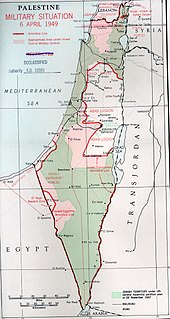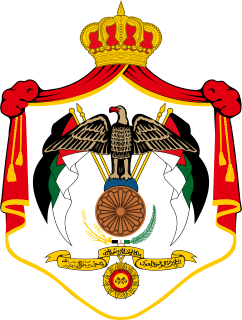| |||||
| Decades: | |||||
|---|---|---|---|---|---|
| See also: | |||||
| |||||
| Decades: | |||||
|---|---|---|---|---|---|
| See also: | |||||

Abdullah II bin Al-Hussein is King of Jordan, reigning since 7 February 1999. He is a member of the Hashemite dynasty, the royal family of Jordan since 1921, and is considered a 41st-generation direct descendant of Muhammad.

The 1949 Armistice Agreements are a set of armistice agreements signed during 1949 between Israel and neighboring Egypt, Lebanon, Jordan, and Syria to formally end the official hostilities of the 1948 Arab–Israeli War, and establish armistice lines between Israeli forces and Jordanian-Iraqi forces, also known as the Green Line.
Mushir is an Arabic word meaning "counsellor" or "advisor". It is related to the word shura, meaning consultation or "taking counsel".

Tawfik Abu al-Huda served several terms as Prime Minister of Jordan. First he served as Prime minister of Transjordan from September 28, 1938, to October 15, 1944, and he served another term from December 28, 1947, to April 12, 1950. Between July 25, 1951, and May 5, 1953, and from May 4, 1954, to May 30, 1955, he served as Prime Minister of Jordan. During his last term as Prime Minister, he tried to consolidate the power of King Hussein by holding parliamentary elections which many accused of being fraudulent. His terms are notable for the 1948 Arab-Israeli War, during which Transjordan conquered the West Bank, and the forced abdication of King Talal.

Fawzi El-Mulki (1910–1962) was a Jordanian diplomat and politician. While serving as ambassador to the United Kingdom in the early 1950s, he befriended King Hussein, who was studying there. In 1953 Hussein appointed al-Mulki to be prime minister of Jordan. He was dismissed in 1954 after his liberal policies caused riots throughout the country.

The superorder Elopomorpha contains a variety of types of fishes that range from typical silvery-colored species, such as the tarpons and ladyfishes of the Elopiformes and the bonefishes of the Albuliformes, to the long and slender, smooth-bodied eels of the Anguilliformes. The one characteristic uniting this group of fishes is they all have leptocephalus larvae, which are unique to the Elopomorpha. No other fishes have this type of larvae.
Ali Sadreddine Al-Bayanouni is a Muslim Brotherhood leader in exile in London. He was born in 1938 in Aleppo and brought up in a religious family, where his father and grandfather were both well known Muslim scholars. He joined the Muslim Brotherhood while in secondary school, in 1954, and went on to graduate with a law degree from the University of Damascus in 1963. He served as a reserve officer in the Syrian Army from 1959 to 1960. Bayanouni became a member of the Syrian Muslim Brotherhood's Shura Council and Executive Office in 1972. Due to his membership of the Muslim Brotherhood, Bayanouni was imprisoned from 1975 to 1977. After his time in prison, he emerged to become the deputy leader of the Brotherhood in 1977. He left Syria two years later and eventually settled in Jordan, where he remained for twenty years. He arrived in Britain as a political refugee in 2000, after the Jordanian authorities requested he leave the country.

Jordan, officially the Hashemite Kingdom of Jordan, is a country in Western Asia. It is situated at the crossroads of Asia, Africa and Europe, within the Levant region, on the East Bank of the Jordan River. Jordan is bordered by Saudi Arabia to the south and east, Iraq to the northeast, Syria to the north, and Israel, West Bank of Palestine, and the Dead Sea to the west. In the southwest, it has a 26 km (16 mi) coastline on the Gulf of Aqaba in the Red Sea. The Gulf of Aqaba separates Jordan from Egypt. Amman is Jordan's capital and largest city, as well as its economic, political, and cultural centre.

The Altendorf tomb was an important megalithic tomb at Altenburg near Naumburg, northern Hesse, Germany. It was a gallery grave belonging to the Late Neolithic Wartberg culture. The Altenburg tomb is of special significance in Central European prehistory because of the large number of individuals it contained.

The Parliament of Jordan is the bicameral Jordanian national assembly. Established by the 1952 Constitution, the legislature consists of two houses: the Senate and the House of Representatives.

Hashemite Kingdom of Jordan/Israel Mixed Armistice Commission was the United Nations organisation of observers which dealt with complaints from Jordan and Israel to maintain the fragile cease fire along the demarcation line between Israel and Jordan. At the closing of the 1948 Arab-Israeli War, on 3 April 1949, the Hashemite Kingdom of Jordan signed a truce with Israel called the 1949 Armistice Agreements. The United Nations Truce Supervision Organisation posted Military Observers as part of the Mixed Armistice Commissions (MACs) to Observe the truce on the Cease fire line and to liaise with the Israeli and Jordanian local area commanders. While the 1948 war was concluded with the 1949 Armistice Agreements it has not marked the end of the Arab–Israeli conflict. The HKJ/IMAC was the organisation which monitored the Jordan/Israel truce agreement, the HJK/IMAC Headquarters was located in Jerusalem close to the Green Line and, through close liaison with the UNTSO headquarters in Government House, Jerusalem, was charged with supervising the truce, investigating border incidents, and taking remedial action to prevent the recurrence of such incidents along the Jordan/Israel Green Line.

Hazza' Barakat al-Majali was two-time Prime Minister of Jordan. His first term lasted one week in 1955, his second term lasted from mid-1959 until his assassination.
The 1954 Jordan League was the 9th season of Jordan Premier League, the top-flight league for Jordanian association football clubs. The championship was won by Al-Ahli.

Al-Ahli Sports Club, is one of the oldest clubs in Jordan based in Amman, established in 1944 by a group of pioneers who helped in setting the groundwork of sport, social, and cultural life in Jordan.

Faisal II was the last King of Iraq. He reigned from 4 April 1939 until July 1958, when he was killed during the 14 July Revolution. This regicide marked the end of the thirty-seven-year-old Hashemite monarchy in Iraq, which then became a republic.
Tragocephalini is a tribe of longhorn beetles of the subfamily Lamiinae. It was described by James Thomson in 1857.

Estrobin, also known as α,α-di(p-ethoxyphenyl)-β-phenylbromoethylene and commonly abbreviated as DBE, is a synthetic, nonsteroidal estrogen of the triphenylethylene group that was never marketed. Chlorotrianisene, and subsequently clomifene and tamoxifen, were derived from it. Estrobin, similarly to other triphenylethylenes, is very lipophilic and hence very long-lasting in its duration of action. Similarly to chlorotrianisene, estrobin behaves a prodrug to a much more potent estrogen in the body.

The 1954 United States Senate special election in California was held on November 2, 1954, to elect a U.S. Senator to complete the unexpired term of Senator Richard Nixon, who resigned on becoming Vice President of the United States following the 1952 presidential election. Incumbent Republican U.S. Senator Thomas Kuchel, who had been appointed by Governor Earl Warren, won election to the remainder of the term, defeating Democratic nominee Sam Yorty.

Jordanian nationality law is the law governing the acquisition, transmission and loss of Jordanian citizenship. Jordanian citizenship is the status of being a citizen of the Hashemite Kingdom of Jordan and it can be obtained by birth, marriage or naturalization.